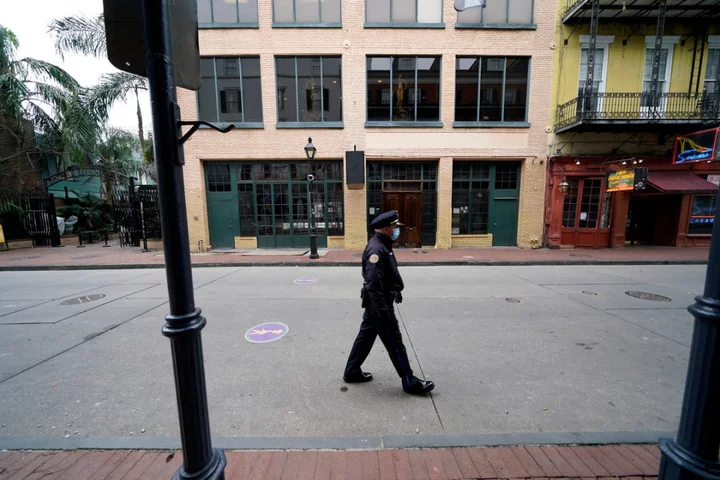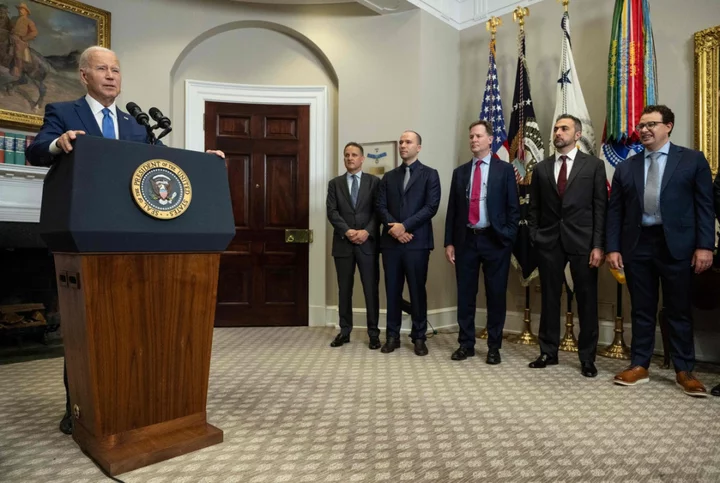
Earthshot Prize: Prince William says climate crisis too visible to be ignored
The Prince of Wales strikes a note of optimism as he reveals the winners of his annual Earthshot Prize.
2023-11-07 21:53

Israel Gaza: Joe Biden calls for 'pause' in conflict
He is responding to a heckler's demand for a ceasefire in a war which has claimed thousands of lives.
2023-11-02 13:22

Donald Trump Jr testifies in New York civil fraud trial
The ex-president's eldest son cracks jokes and denies wrongdoing in the Manhattan court.
2023-11-02 05:18

New Orleans facial recognition tool mostly used against Black suspects
After the New Orleans City Council voted to allow the use of facial recognition software to identify criminals more readily and accurately, reports indicate that the technology was ineffective and erroneous. This system went into effect in the summer of 2022, and Politico obtained records of the year’s worth of results. The outlet found that not only was the facial recognition tool vastly incapable of identifying suspects, but it was also disproportionately used on Black people. And from October 2022 to August 2023, almost every facial recognition request regarded a Black suspect. Politico reported that in total, the department made 19 requests. However, two of them were thrown out because police had identified the suspect before the system’s results came back, while two others were rejected because the program’s application didn’t extend to those crimes. So, of the 15 requests made by the New Orleans Police Department, 14 concerned Black suspects, the outlet wrote. On top of this, only six of these requests turned up with matches — and half of those were erroneous — while the remaining nine did not pull up a match. Facial recognition technology has long been controversial. The city of New Orleans previously had banned the use of facial recognition software, which went into effect in 2020 following the death of George Floyd. Then, in 2022, the city reversed course, allowing it to be used. In the wake of the reversal, the ACLU of Louisiana Advocacy Director Chris Kaiser called the new ordinance “deeply flawed.” He not only pointed out research that indicated that “racial and gender bias” affected the program’s accuracy but also highlighted privacy concerns around the data that the program relies on when identifying potential suspects. A previous investigation by The Independent revealed that at least six people around the US have been falsely arrested using facial ID technology; all of them are Black. One such arrest occurred in Louisiana, where the use of facial recognition technology led to the wrongful arrest of a Georgia man for a string of purse thefts. Regardless of the false arrests, at least half of federal law enforcement agencies with officers and a quarter of state and local agencies are using it. At least one council member acknowledged the shortcomings of this technology. “This department hung their hat on this,” New Orleans Councilmember At-Large JP Morrell told Politico. Mr Morrell voted against using facial recognition last year. After seeing the police department’s data and usage, he said the tool is “wholly ineffective and pretty obviously racist.” “The data has pretty much proven that advocates were mostly correct,” Mr Morell continued. “It’s primarily targeted towards African Americans and it doesn’t actually lead to many, if any, arrests.” City councillor Eugene Green, who introduced the measure to lift the ban, holds a different view. He told Politico that he still supports the agency’s use of facial recognition. “If we have it for 10 years and it only solves one crime, but there’s no abuse, then that’s a victory for the citizens of New Orleans.” It is important to note that despite hiccups with the system’s results, the agency’s use has led to any known false arrests. “We needed to have significant accountability on this controversial technology,” council member Helena Moreno, who co-authored the initial ban, told the outlet. New Orleans has a system in place in which the police department is required to provide details of how the tool was used to the City Council on a monthly basis; although Politico disclosed that the department agreed with the council that it could share the data quarterly. When asking about the potential flaws with the facial recognition tool, as outlined by Politico’s reporting, a New Orleans Police Department spokesperson told The Independent that “race and ethnicity are not a determining factor for which images and crimes are suitable for Facial Recognition review. However, a description of the perpetrator, including race, is a logical part of any search for a suspect and is always a criterion in any investigation.” The department spokesperson also emphasised that its investigators do not rely solely on facial recognition, “but it is one of multiple tools that can be used to aid in investigations,” like evidence and/or forensics, adding that officers are trained to conduct “bias-free investigations.” “The lack of arrests in which Facial Recognition Technology was used as a tool, is evidence that NOPD investigators are being thorough in their investigations,” the statement concluded. Read More Cousins may have Achilles tendon injury; Stafford, Pickett, Taylor also hurt on rough day for QBs Four tracts of federal waters in the Gulf of Mexico are designated for wind power development A salty problem for people near the mouth of the Mississippi is a wakeup call for New Orleans Gulf oil lease sale postponed by court amid litigation over endangered whale protections What is super fog? The mix of smoke and dense fog caused a deadly pileup in Louisiana What is super fog? Weather phenomenon causes fatal Louisiana pile-up
2023-11-01 06:57

Why Donald Trump's children will testify in his civil fraud trial
Don Jr, Eric and Ivanka Trump will all take the stand in their father's civil fraud trial in New York.
2023-11-01 05:46

The Whiteboard: Mavs new Luka Doncic plan, James Harden trade grades
Today on The Whiteboard — James Harden finally gets his trade and the Mavericks are trying something new with Luka Doncic.
2023-11-01 01:56

Natalie Raanan, a teen taken hostage by Hamas, is home in Chicago
Natalie Raanan and her mother Judith were visiting family in Israel when they were taken hostage on 7 October.
2023-11-01 00:51

Eric Cantona career change inspired by Vincent Van Gogh
Manchester United icon Eric Cantona took inspiration from Vincent Van Gogh for his new music career.
2023-10-31 16:18

Cornell University boosts security after antisemitic threats
The FBI has been alerted over online posts that used slurs about Jewish students at the New York college.
2023-10-31 05:16

Why Biden is so concerned about AI
President Joe Biden is addressing concerns about artificial intelligence as the administration attempts to guide the development of the rapidly evolving technology. The White House said on Monday (30 October) that a sweeping executive order will address concerns about safety and security, privacy, equity and civil rights, the rights of consumers, patients, and students, and supporting workers. The order will also hand a list of tasks to federal agencies to oversee the development of the technology. ‘We have to move as fast, if not faster than the technology itself’ “We can’t move at a normal government pace,” White House Chief of Staff Jeff Zients quoted Mr Biden as telling his staff, according to the AP. “We have to move as fast, if not faster than the technology itself.” Mr Biden believes that the US government was late to the game to take into account the risks of social media, leading to the related mental health issues now seen among US youth. While AI may help drastically develop cancer research, foresee the impacts of the climate crisis, and improve the economy and public services, it may also spread fake images, audio and videos, with possibly widespread political consequences. Other harmful effects include the worsening of racial and social inequality and the possibility that it can be used to commit crimes, such as fraud. The president of the Center for Democracy & Technology, Alexandra Reeve Givens, told the AP that the Biden administration is using the tools at their disposal to issue “guidance and standards to shape private sector behaviour and leading by example in the federal government’s own use of AI”. Mr Biden’s executive order comes after technology companies have already made voluntary commitments, and the aim is that congressional legislation and international action will follow. The White House got commitments earlier this year from Google, Meta, Microsoft, and OpenAI to put in place safety standards when building new AI tools and models. Monday’s executive order employs the Defense Production Act to require AI developers to share safety test results and other data with the government. The National Institute of Standards and Technology is also set to establish standards governing the development and use of AI. Similarly, the Department of Commerce will publish guidance outlining the labelling and watermarking of content created using AI. An administration official told the press on Sunday that the order is intended to be implemented within between 90 days and a year. Safety and security issues have the tightest deadlines. Mr Biden met with staff last Thursday for a half-hour meeting that grew into an hour and 10 minutes to put the finishing touches on the order. Biden ‘impressed and alarmed’ by AI The president was engaged in meetings about the technology in the months that preceded Monday’s order signing, meeting twice with the Science Advisory Council to discuss AI and bringing up the technology during two cabinet meetings. At several gatherings, Mr Biden also pushed tech industry leaders and advocates regarding what the technology is capable of. Deputy White House Chief of Staff Bruce Reed told the AP that Mr Biden “was as impressed and alarmed as anyone”. “He saw fake AI images of himself, of his dog,” he added. “He saw how it can make bad poetry. And he’s seen and heard the incredible and terrifying technology of voice cloning, which can take three seconds of your voice and turn it into an entire fake conversation.” The AI-created images and audio prompted Mr Biden to push for the labelling of AI-created content. He was also concerned about older people getting a phone call from an AI tool using a fake voice sounding like a family member or other loved one for the purpose of committing a scam. Meetings on AI often went long, with the president once telling advocates: “This is important. Take as long as you need.” Mr Biden also spoke to scientists about the possible positive impacts of the technology, such as explaining the beginning of the universe, and the modelling of extreme weather events such as floods, where old data has become inaccurate because of the changes caused by the climate crisis. ‘When the hell did I say that?’ On Monday at the White House, Mr Biden addressed the concerns about “deepfakes” during a speech in connection with the signing of the order. “With AI, fraudsters can take a three-second recording of your voice, I have watched one of me on a couple of occasions. I said, ‘When the hell did I say that?’” Mr Biden said to laughter from the audience. Mr Reed added that he watched Mission: Impossible — Dead Reckoning Part One with Mr Biden one weekend at Camp David. At the beginning of the film, the antagonist, an AI called “the Entity”, sinks a submarine, killing its crew. “If he hadn’t already been concerned about what could go wrong with AI before that movie, he saw plenty more to worry about,” Mr Reed told the news agency. The White House has faced pressure from a number of allied groups to address possible harmful effects of AI. The director of the racial justice programme at The American Civil Liberties Union, ReNika Moore, told the AP that the union met with the administration to make sure “we’re holding the tech industry and tech billionaires accountable” so that the new tools will “work for all of us and not just a few”. Ex-Biden official Suresh Venkatasubramanian told the news agency that law enforcement’s use of AI, such as at border checkpoints, is one of the top challenges. “These are all places where we know that the use of automation is very problematic, with facial recognition, drone technology,” the computer scientist said. Read More Biden reacts to watching deepfakes of himself: ‘When the hell did I say that?’ Rishi Sunak to hold live chat with Elon Musk during AI summit Liz Truss ‘deeply disturbed’ by Sunak’s invitation to China to attend AI summit Extinction risk from AI on same scale as nuclear war, Sunak warns Revealed: Government using AI to decide on benefits and driving licences Brexit means UK can be global leader on AI, says Facebook co-founder
2023-10-31 04:24

What did he say? CFB announcer has possible NSFW call for West Virginia INT
While calling a funky interception West Virginia defender Beanie Bishop Jr. made on UCF quarterback John Rhys Plumlee, FOX play-by-play guy Eric Collins may have had an NFSW call of the play in question. "What a funky interception?!"
2023-10-29 03:52

Women seriously injured in XL bully attack
Irish police say two women are being treated in hospital for serious injuries after a dog attack.
2023-10-29 03:45
